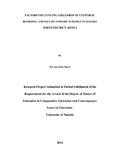| dc.description.abstract | The purpose of this study was to investigate the factors influencing girls’ drop out in
public boarding and day secondary schools in Masaba North District. The study was
guided by four objectives which were to examine the extent to which socio-economic
factors influence girls’ drop out, to establish the influence of individual factors on
girls’ dropout rate, to establish the influence of school factors on girls’ dropout rate
and to determine the influence of gender policy implementation on girls’ dropout rate.
In literature review the study focused on the factors influencing girls’ dropout in
public boarding and day secondary schools in Masaba North District. It reviewed the
gap under the following sub themes: overview of girls’ dropout, influence of socioeconomic
factors, family background and girls dropout, economic status of the family,
cultural status, individual factors, gender and girls’ dropout, aspiration and girls’
dropout, age and girls’ dropout, school based factors, sanitation, school levies,
teaching learning resources, peer influence and gender policy implementation. The
study adopted the relevant conceptual framework which guided the researcher in
determining the variables.
The study employed descriptive design method using focus group discussion and
questionnaires as the main research instruments. The study targeted all the 20 public
secondary schools in the district with a total population of 600 teachers, 7,213
students and the head teachers were sampled in the study. One teacher from every
school was also selected (in charge of guidance and counseling). The form fours were
the most respondents because they had been in school for long.
Data was analyzed using frequencies and percentages and presented in tables and
conclusions drawn. Therefore the study found out that the factors in questions have
high influence in girls school drop-out. The gender policy implementation is the key
to minimize the drop out. The study therefore called for collaborative efforts by
government and other players in providing civic education on behavior change. | en_US |

